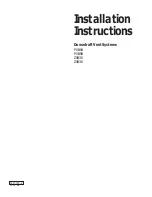
Operating instructions
A4D630-AH01-01
Translation of the original operating instructions
We recommend the use of 105 °C cables. Ensure that the minimum
cable cross-section is at least
AWG 26 / 0.13 mm².
4.2.2 Residual current circuit breaker (RCCB)
If the use of a residual current device (RCD) is required in your
installation, only pulse-current sensitive and/or AC/DC-
sensitive residual current devices (type A or B) are
permissible. As with variable frequency drives, residual current
devices cannot provide personal safety while operating the
device.
4.2.3 Voltage control
NOTE
Current overshoots may occur if speed control is implemented
by transformers or electronic voltage regulators (e.g. phase
control). Depending on the type of installation of the device,
noise and vibration may also occur in the case of phase
control. Vibration can lead to bearing damage and thus
premature failure.
Heating-up of the motor when using voltage control must be checked by
the customer following installation in the end device.
4.2.4 Variable frequency drive
Please use a variable frequency drive only after consultation with ebm-
papst.
For operation with variable frequency drives, install sinusoidal
filters that work on all poles (phase-phase and phase-ground)
between the drive and the motor.
During operation with variable frequency drives, an all-pole
sine filter protects the motor against high-voltage transients that
can destroy the coil insulation system, and against harmful
bearing currents.
Heating-up of the motor when using a variable frequency drive must be
checked by the customer following installation in the end device.
4.3 Connection in terminal box
4.3.1 Preparing cables for connection
Only strip the cable as far as necessary, ensuring that the cable gland is
sealed and there is no strain on the connections. For tightening torques,
see Chapter 3.1 Product drawing.
NOTE
Tightness and strain relief are dependent on the cable
used.
→ This must be checked by the user.
4.3.2 Connecting wires to terminals
;
Remove the cap from the cable gland.
Only remove caps where cables are fed in.
;
Route the wire(s) (not included in scope of delivery) into the terminal
box.
;
First connect the "PE" (protective earth).
;
Connect the wires to the corresponding terminals.
;
Connect the thermal overload protector (TOP).
Use a screwdriver to do so.
When connecting, ensure that no wire ends fan out.
;
Seal the terminal box.
4.3.3 Cable routing
Water must be prevented from reaching the cable gland along the cable.
NOTE
Damage caused by moisture penetration.
Moisture can penetrate into the terminal box if water is
constantly present at the cable glands.
→ To prevent the constant accumulation of water at the cable
glands, the cable should be routed in a U-shaped loop
wherever possible.
→ If this is not possible, a drip edge can be produced by
fitting a cable tie directly in front of the cable gland for example.
Fans installed lying flat
Make sure the cable is routed in a U-shaped loop.
Fig. 2: Fan installed lying flat, cable routed in a U-shaped loop.
Fans installed upright
When routing the cable, make sure that the cable glands are located at
the bottom. The cables must always be routed downward.
Fig. 3: Cable routing for fans installed upright.
Item no. 10929-5-9970 · ENU · Change 227768 · Approved 2021-02-03 · Page 7 / 12
ebm-papst Mulfingen GmbH & Co. KG · Bachmühle 2 · D-74673 Mulfingen · Phone +49 (0) 7938 81-0 · Fax +49 (0) 7938 81-110 · [email protected] · www.ebmpapst.com






























